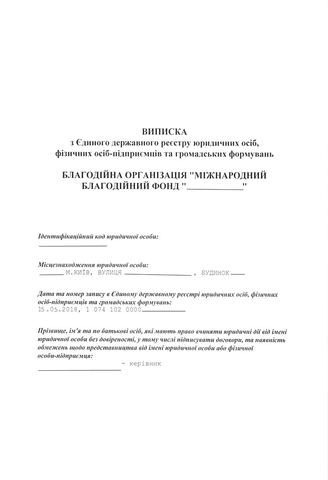Structuring the work of a charitable foundation in Ukraine
Cost of services:
Reviews of our Clients
Charitable organizations are established to conduct philanthropic activities. If you don't have plans to engage in charitable endeavors, it's advisable to consider establishing other forms of non-profit organizations, such as public associations. For instance, we recently had a client who wanted to rally their colleagues around a specific idea and promote it. In such cases, we recommended and facilitated the registration of a public association.
When you're strategizing for a large-scale charitable project involving foreign investments or volunteer work, it's essential to commence not only with the registration of a charitable foundation but also with meticulous planning and structuring of the fund's operational framework and its prospective activities.
Given our familiarity with this task, we will underscore the pivotal facets of organizing the functions of charitable funds within the context of Ukraine. However, if you prefer to steer clear of intricacies and seek professional guidance, don't hesitate to contact our experts.
You may also like: Virtual Banking and Financial Management for Public Organizations
What You Need to Know to Effectively Set Up a Charitable Organization
A charitable organization is a legal entity and can engage in legal relationships. Thus, if you're planning to register a charitable organization, it's advisable to take into account the following aspects:
1. Taxes. A charitable organization operates as a nonprofit entity, and it's crucial to safeguard its non-profit status. For instance, avoid dispersing the funds of the charitable organization among its founders (except for salaries and associated taxes) or conducting activities that fall outside the scope of its charter.
Regrettably, there have been instances where clients intended to establish a charitable organization and receive remuneration for services through their businesses. In such scenarios, there exists a risk of compromising the nonprofit status.
Learn more about the nonprofit status here.
2. Staff. If a charitable organization employs staff, it's crucial to ensure proper wage disbursement and tax contributions for them. This entails submitting relevant reports to regulatory bodies. Another option in such a scenario is to involve volunteers in the organization's activities. However, to pursue this path, it's advisable to formally include the charitable organization in the list of entities authorized to engage volunteers.
For instance, we serve multiple Charitable Foundations whose founders are non-residents. Regardless of the foundation's operational status, whether active or not, it's necessary to manage payroll and maintain accurate personnel records. We also aid in structuring operations using either volunteers or hired personnel:
- Volunteers who participate in the organization's activities are formally onboarded through appropriate agreements.
- Hired personnel within the foundation undergo the complete employment procedure, even in cases involving foreign citizens (which do occur), and personnel records are meticulously upheld for these staff members.
3. Accounting. Effective operation of charitable organizations entails maintaining comprehensive accounting practices and submitting accurate financial reports. If your organization doesn't anticipate any monetary transactions or the transfer of assets or property rights, you may opt to file zero-value reports. However, if your organization plans to engage in activities involving asset utilization or property transfers, it is imperative to uphold meticulous accounting practices for the following reasons:
- Failure to submit accurate or punctual financial reports could lead to the imposition of fines and potential tax audits for the charitable organization.
- Lack of robust accounting support could result in operational challenges and hinder the organization's ability to undergo thorough audits. For instance, we recently aided a client seeking assistance from an international donor. A prerequisite for this aid was an audit. However, our client wasn't adequately prepared for such an audit due to insufficient accounting support. Working closely with our accountant, we had to meticulously review the organization's history and activities, address any gaps, and subsequently proceed with the audit.
- Failure to meet timely payroll obligations may provide grounds for administrative actions, and in certain circumstances, even criminal liability.
Please note! Financial reports must be submitted to avoid penalties.
4. Legal Implications. For the smooth functioning of a charitable organization, especially when actively engaged in operations, continuous and professional legal support is essential. Legal professionals can assist with contract-related matters, and personnel issues, and provide valuable advice. Choosing not to engage legal experts and missing out on their professional guidance could lead to unfavorable consequences such as fines, legal disputes, and even criminal proceedings.
Recently, a charitable foundation sought our assistance in organizing one of their charitable projects. This initiative aimed to support women in establishing and refining the operations of a business focused on producing household goods. Acting as a donor, the charitable foundation, with our assistance, devised a comprehensive structure. Thanks to the input of legal experts and the provision of financial support, the beneficiaries of this charitable aid received valuable assistance. The collaborative efforts led to the successful creation and launch of a potentially impactful project.
5. Organizational Considerations. Efficient and seamless operation is key for a charitable organization. Right from the outset, we recommend establishing a streamlined document workflow and developing a clear hierarchy for employee interactions, task execution, and following management directives. A charitable foundation approached us under a volunteer agreement. After discussions with the foundation's leader, it became evident that the foundation lacked a structured document workflow and document templates. We proposed implementing a well-organized document workflow and creating standardized document templates. We provided drafts for:
- Service/Work/Sale Contracts
- Memorandums of Cooperation
- Employment Contracts, Non-Disclosure Agreements
- Volunteer Contracts
- Templates for Orders, Applications, Directives
- Internal Regulations and Guidelines for Foundation Operations
Our company specializes in providing comprehensive support to charitable organizations at different levels of development. We offer assistance both at the inception stage and through engagement in specific projects.
You may also like: How to Secure an International Grant for a Ukrainian Public Organization?
Internal Operational Considerations for Charitable Organizations
Naturally, not all operational intricacies of a charitable organization can be fully captured within its charter. Consequently, it's quite common for charitable organizations to institute documents at the level of internal local regulations to effectively govern various aspects, such as:
- Rules and Procedures for Executing Charitable Projects
These documents can delineate criteria for beneficiary selection, procedural intricacies tied to disbursing charitable aid, and the decision-making process. For instance, envision a charitable foundation confronted with numerous applications for beneficiary designation, but a budget that permits selection of only one.
- Management of Personal Data and Confidential Information.
- Protocols for Engaging and Coordinating Volunteers.
- Processes for Document Alignment with Leadership.
- Additionally, charitable organizations might adopt supplementary regulations introduced by their parent entities.
All the documents mentioned above are crafted through instructions, regulations, and similar means, and are typically approved through directives issued by the head of the charitable organization.
Structuring the operations of a charitable organization involves establishing efficient and effective workflows, and addressing internal and external factors that impact activities and overall efficiency.
The process of structuring operations can be approached in two ways:
- Setting up operations at the outset or when required.
- Ensuring consistent legal, accounting, and HR services.
Our specialists are poised to assist you with the aforementioned tasks.
If you're interested in:
- Choosing the appropriate registration format for your charitable organization that aligns with your objectives.
- Fulfilling your organization's operational needs in Ukraine, including legal, accounting, and personnel support, comprehensive reporting, recruitment processes, volunteer engagement procedures, and migration services.
- Partnering with a reliable legal collaborator experienced in working specifically with nonprofit entities.
Feel free to reach out to us!
For the cost of registering a charitable foundation, click here.
For the cost of servicing charitable organizations, click here.
Our clients







